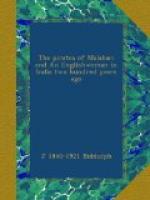Among all the naval officers sent to the Indian seas at that time, Warren appears to have been the only one who really tried to protect the Company’s interests. Littleton quarrelled with Sir Nicholas Waite, and had questionable dealings with the Madagascar pirates. Richards and Harland quarrelled with Sir John Gayer, and crippled the Company’s ships by forcibly pressing their sailors to fill up their own crews; while Matthews exceeded them all in outrageous behaviour, as will be recounted in its place.
After capturing the Quedah Merchant, Kidd shaped his course for Madagascar, where he found Culliford in the Resolution, who at first treated him with suspicion, hearing that he had a commission to capture pirates. But Kidd soon reassured him over sundry cups of bombo, protesting with many oaths that ‘his soul should fry in hell’ sooner than that he should hurt a hair of one of Culliford’s crew; and, as a proof of good will, presented him with two guns and an anchor. Then, finding the Adventure had become unseaworthy, he abandoned her, and sailed for New England in the Quedah Merchant. In June, 1799, he reached Boston.
Before his arrival, he heard he had been proclaimed a pirate, so he deputed a friend to approach Lord Bellamont on his behalf. The Quedah Merchant was disposed of, and his plunder placed in a safe place. By assurance, and by a valuable present to Lady Bellamont, he thought he could face matters out. Bellamont appears to have been puzzled at first how to treat him. He was unwilling to believe all that was said. At the end of three weeks he made up his mind and arrested Kidd. For eight months he lay in Boston gaol, and was then sent to London for trial, remaining in Newgate for more than a year. Eleven of his crew were also arrested, two of them being admitted as King’s witnesses.
In the interval the storm against the Whig ministers had gathered strength, and articles of impeachment against Somers, Orford, and others were being prepared by the House of Commons. On the 27th March, 1701, Kidd was brought to the House to be examined, but he said nothing to inculpate any of the owners of the Adventure, so a resolution was passed that he should be proceeded against according to law.




